Establishing goals and tracking progress requires key performance indicators (KPIs) and benchmarks. However, given the multitude of KPIs available, determining the right ones to benchmark can be challenging.
SEO benchmarks enable us to observe before-and-after results for specific KPIs, providing insights into the progress of our SEO campaign.
Benchmarks also allow us to communicate the value of our work to clients. If you aren’t tracking your SEO performance already using the power of benchmarks, we’ll show you how to start.
What is a Benchmark?
Benchmarks are a standard or point of reference against which things may be compared or assessed. Benchmarking is more than just monitoring SEO performance. It’s about understanding your position in the market.
Let’s delve into a practical example within the e-commerce sphere, focusing on an established player, ‘FashionHub.’ Imagine FashionHub, a well-known platform specializing in trendy clothing and accessories, aiming to enhance its SEO game. In this context, we can draw comparisons with a competitor, ‘StyleEmpire,’ which has consistently dominated the online fashion market.

FashionHub vs StyleEmpire SEO Analysis
We’re going to analyze the most important metrics:
- Organic traffic: How much traffic each site gets, on average, from search engines.
- Keyword rankings: What keywords, out of all available, rank in the top 10 results
- Backlink profile: How many backlinks from authoritative sites each site has.
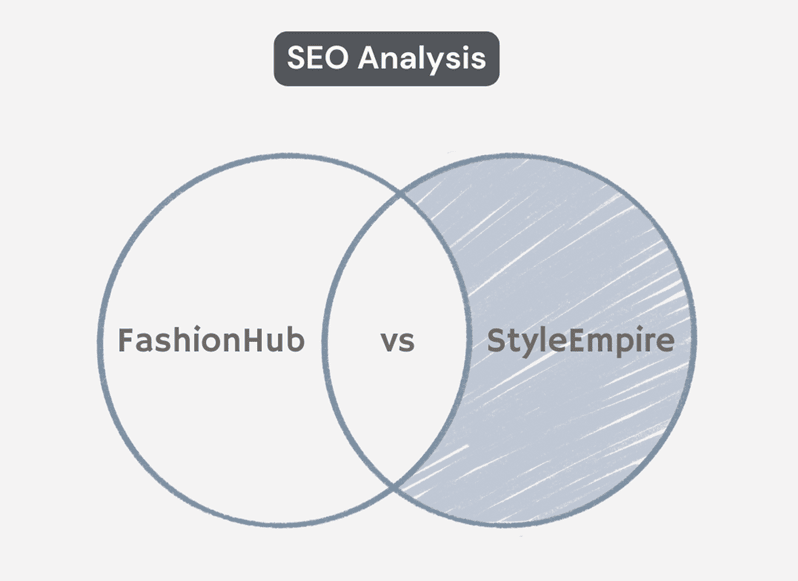
Organic Search Traffic
- FashionHub: 100,000 monthly organic visitors
- StyleEmpire: 300,000 monthly organic visitors
Analyzing these numbers reveals a substantial gap in organic search traffic between FashionHub and StyleEmpire. This prompts further investigation into StyleEmpire’s strategies for attracting a larger audience, including keywords, content strategies, and user engagement methods.
Keyword Rankings
- FashionHub: Top 10 rankings for 30% of target keywords
- StyleEmpire: Top 10 rankings for 70% of target keywords
StyleEmpire’s dominance in keyword rankings becomes evident, indicating areas where FashionHub can optimize its content to improve rankings and visibility.
Backlink Profiles
- FashionHub: 500 high-quality backlinks from authoritative sites
- StyleEmpire: 1,500 high-quality backlinks from authoritative sites
A comparative analysis of backlink profiles underscores a significant difference in both the quantity and quality of backlinks. FashionHub can draw insights from StyleEmpire’s backlink acquisition strategies to strengthen its backlink portfolio.
By benchmarking against StyleEmpire in these key areas, FashionHub gains actionable insights. This data-driven approach enables FashionHub to refine its SEO strategy, enhance its online visibility, and compete more effectively in the fiercely competitive online fashion market.
What is SEO Benchmarking?
SEO benchmarking consists of an analysis of the company’s website, competitor sites, and other well-positioned pages to uncover effective optimization strategies and techniques. The goal is to glean insights from successful examples and apply them to enhance the optimization of the company’s website. By embracing SEO-focused benchmarking, a company can develop and execute superior positioning strategies, ultimately aiming for improved rankings within Google’s Search Engine Results Pages (SERPs).
How to Start SEO Benchmarking Step-By-Step
Through the comparison of your website’s SEO metrics with essential benchmarks, gaining insights into your competitor’s strategies, and evaluating industry standards, you can pinpoint opportunities for improvement and customize your SEO strategy. Follow this step-by-step process for SEO benchmarking:
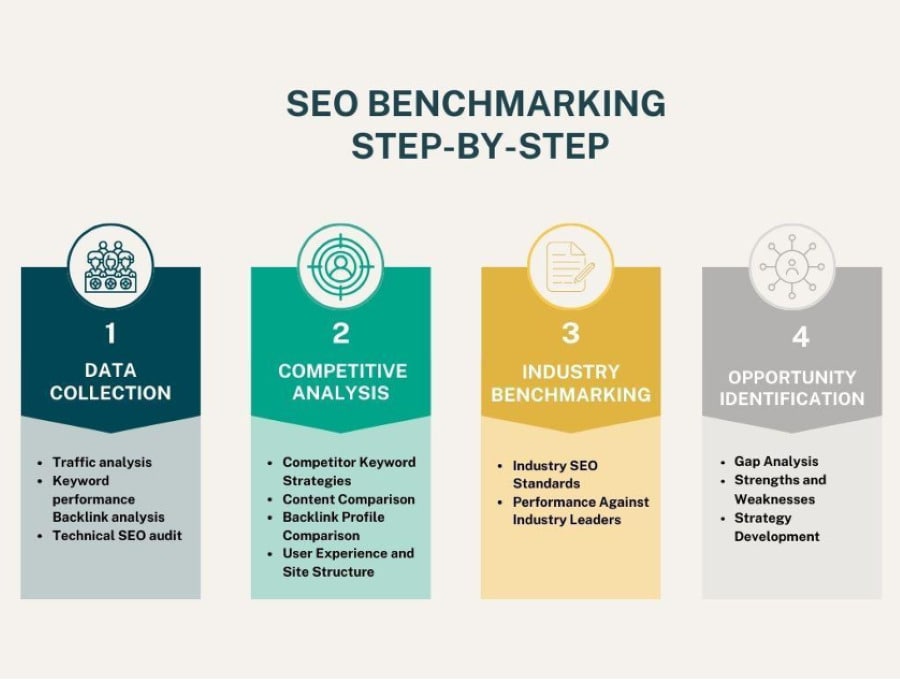
Data Collection
The first step in SEO benchmarking is gathering a wealth of data on your website’s current SEO performance. Benchmark SEO involves using advanced tools and analytics to collect detailed information across various areas:
- Traffic Analysis: Understanding the sources and volume of your website’s traffic, focusing particularly on organic search.
- Keyword Performance: Evaluating the effectiveness of your current keywords in driving traffic and their rankings on search engine results pages.
- Backlink Analysis: Assessing the quantity and quality of backlinks pointing to your website, as they play a crucial role in search engine rankings.
- Technical SEO Audit: Examining technical aspects of your website that impact SEO, such as site speed, mobile optimization, and crawl errors.
Competitive Analysis
The next step for benchmark SEO is to undertake a competitive analysis:
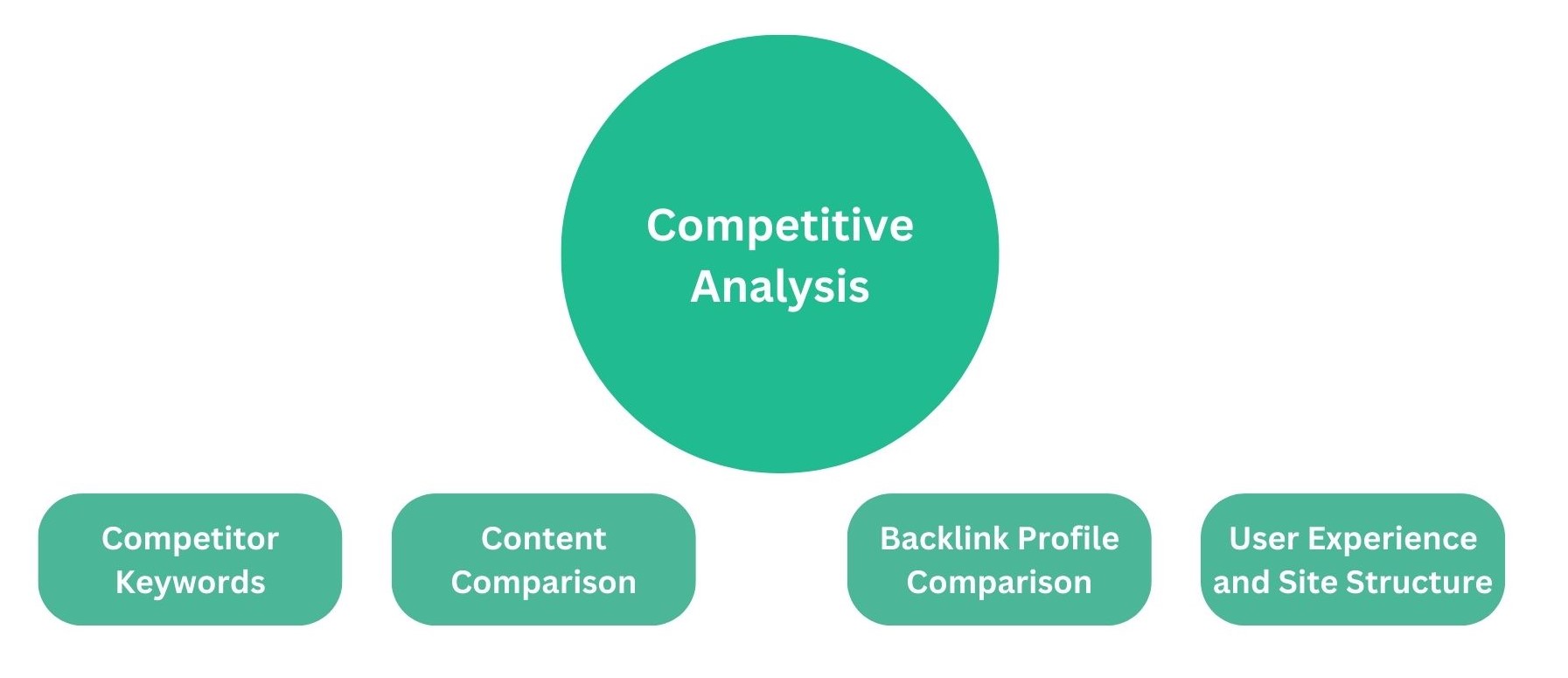
- Competitor Keywords: Analyze what keywords your competitors are targeting and how well they rank for those terms. Tools like SEMrush or Ahrefs can provide valuable insights into competitors’ keyword strategies.
- Content Comparison and Content Gap Analysis: Thoroughly evaluate the quality, relevance, and frequency of content published by your competitors while also identifying content gaps within your strategy. Explore patterns in their content strategy that may contribute to their SEO success, and leverage these insights to address content gaps in your approach. By strategically filling these content gaps, you can enhance your competitiveness and visibility in the digital landscape.
- Backlink Profile Comparison: Compare the backlink profiles of your competitors. Identify where they are getting their backlinks from and the quality of these backlinks.
- User Experience and Site Structure: Assess your competitors’ websites in terms of user experience (UX) and site structure, which can influence SEO rankings.
Industry Benchmarking
After analyzing your website and competitors, the next phase is industry benchmarking:
- Industry SEO Standards: Determine which SEO benchmarks the industry uses, including average traffic, keyword difficulty, and backlink numbers. This can be done through industry reports and SEO benchmarking studies.
- Performance Against Industry Leaders: Compare your SEO metrics with industry leaders and top-performing websites in your sector. Understanding what the industry leaders are doing can offer insights into what it takes to reach the top.
Opportunity Identification
The final step is to analyze the gathered data to identify specific areas for improvement:
- Gap Analysis: Look for gaps between your website’s current SEO performance and that of your competitors or industry benchmarks. This could be in areas like keyword optimization, content quality, or technical SEO.
- Strengths and Weaknesses: Assess the strengths and weaknesses of your current SEO strategy. Capitalize on your strengths and address the weaknesses.
- Strategy Development: Based on this analysis, develop a tailored SEO strategy that targets these opportunities. This could involve focusing on certain types of content, pursuing specific backlinks, or improving technical aspects of your website.
SEO Benchmarking Benefits: Elevating Visibility, Gaining Competitive Edge
Why should you spend the time, effort, and resources on benchmarking? There are a few reasons.
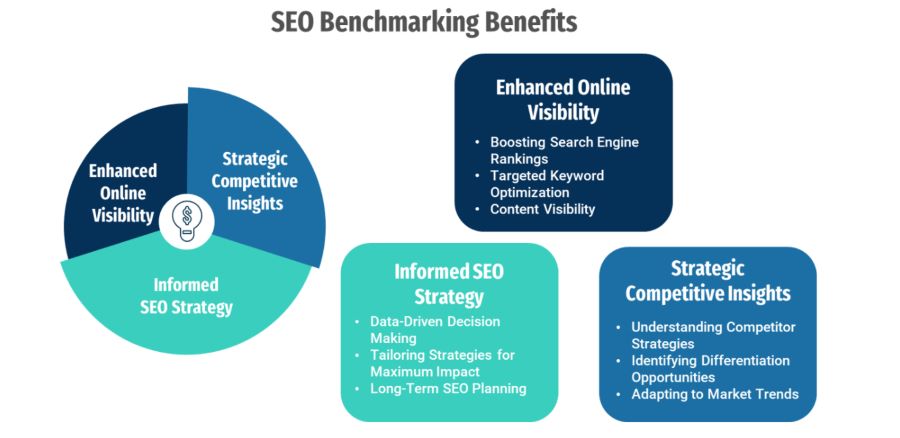
Enhanced Online Visibility
- Boosting Search Engine Rankings: By thoroughly understanding and optimizing your website’s SEO performance, you can significantly improve its ranking on search engine results pages. Higher rankings typically translate to increased visibility, drawing more organic traffic to your site. It varies depending on the nature of the business. For instance, two competitive online fashion market companies are FashionHub and StyleEmpire. FashionHub might attract high traffic volumes, but if the traffic is not converting due to irrelevance, it may not lead to significant sales.
In contrast, StyleEmpire strategically targets specific, long-tail keywords tailored to its niche market, drawing a more focused audience. Despite having lower overall traffic than FashionHub, StyleEmpire’s approach results in higher conversions due to the relevance of its content to the target audience. This example illustrates that in the dynamic online fashion industry, the emphasis should not solely be on the quantity of traffic but rather on the quality and relevance of the traffic for successful conversions and business growth. - Targeted Keyword Optimization: SEO benchmarking allows you to identify and focus on the most effective keywords for your business. By optimizing these keywords in on-page SEO optimization, your website becomes more visible to a targeted audience actively searching for your products or services.
For example, FashionHub may concentrate on generic, high-traffic keywords, leading to a large but less relevant audience. In contrast, StyleEmpire emphasizes niche-specific keywords with lower search volumes, attracting a smaller but highly targeted audience actively seeking its fashion products. Despite having lower overall traffic than FashionHub, StyleEmpire achieves a higher conversion rate and better return on investment (ROI) due to its strategic emphasis on targeted keyword optimization.
Content Visibility
Leveraging insights from benchmarking, you can create content that resonates with your audience and ranks well in search results, further enhancing your website’s visibility and reach.
Strategic Competitive Insights
- Understanding Competitor Strategies: SEO benchmarking provides an in-depth look at your competitors’ SEO tactics, from their keyword usage to their content strategies. This technical SEO assessment helps you understand what works in your industry and what doesn’t.
- Identifying Differentiation Opportunities: By analyzing competitors’ strengths and weaknesses, you can find opportunities to differentiate your website. This could involve capitalizing on keywords they are missing, leveraging content gaps, or employing unique backlink strategies.
- Adapting to Market Trends: Benchmarking keeps you informed about the latest SEO trends and strategies used by competitors, allowing you to adapt and stay competitive in a constantly evolving digital landscape.
Informed SEO Strategy
- Data-Driven Decision Making: SEO benchmarking equips you with data-driven insights, enabling more informed and strategic decisions in your SEO efforts. SEO ROI measurement ensures that every tactic or change is based on concrete data and analysis.
- Tailoring Strategies for Maximum Impact: With detailed benchmarking data, you can tailor your SEO strategy to focus on areas with the most significant potential impact. This might include refining specific on-page elements, targeting particular keywords, or improving certain aspects of user experience.
- Long-Term SEO Planning: Benchmarking provides a foundation for long-term SEO planning. By understanding current performance and industry trends, you can develop a forward-looking SEO strategy that anticipates future market shifts and prepares your website to meet evolving search engine criteria.
What SEO Benchmarks Are Worth Using?
There are a wide range of KPIs related to SEO that you can track. Determining which ones to monitor depends on the specific website you’re optimizing and its unique goals.
Organic Traffic
Organic traffic serves as a vital gauge of SEO effectiveness, revealing how well your strategies are working. This metric reflects the number of visitors arriving via search engines, highlighting the success of your keyword optimization, content relevance, and overall SEO performance. Additionally, monitoring organic traffic trends helps assess the impact of SEO changes, content updates, or algorithm shifts.
Increasing organic traffic typically indicates successful strategies, while declines may signal the need for tactical adjustments.
Keyword Rankings
Keyword rankings offer insights into your search engine visibility for specific terms and phrases, which is crucial for assessing digital presence. By comparing your rankings with competitors, you can identify strengths and weaknesses in your keyword targeting strategy, enabling strategic adjustments to improve your competitive edge.
- Search Visibility: Keyword rankings assess how well your site appears in search engine results for specific terms and phrases. These rankings are crucial for understanding your visibility in the digital space for targeted search queries.
- Competitive Benchmarking: Comparing your keyword rankings to those of your competitors can provide insights into areas where you may be outperforming or lagging, offering opportunities for strategic adjustments in your keyword targeting.
Backlink Profile
Your backlink profile evaluation encompasses both link quantity and quality, with high-quality links from reputable sources enhancing SEO performance. This analysis not only uncovers link-building opportunities but also enables the identification and removal of low-quality or spammy links that could negatively impact your site’s SEO.
- Quality and Quantity of Links: Evaluating your backlink profile involves assessing both the quantity and quality of external sites linking to your website. High-quality backlinks from reputable and relevant sites can significantly boost your SEO performance.
- Link Building Opportunities: Analyzing your backlink profile helps identify potential opportunities for link building. It also allows for the identification and disavowal of low-quality or spammy links that could harm your site’s SEO.
On-Page Factors
On-page factors involve optimizing your website’s content, HTML elements, and structure. This includes content quality, keyword usage, meta tags, and site structure, all of which are crucial for search engines and user experience. A well-structured and accessible site not only aids search engine indexing but also improves user experience, leading to better SEO performance.
User Engagement
Metrics like average time on site, bounce rate, and page views per session provide insights into user interactions with your website. These metrics, along with social media engagement indicators, reflect content relevance, quality, and overall user experience. High engagement levels often indicate valuable and relevant content, positively impacting search engine rankings. Conversely, low engagement may signal areas for content or user experience improvement, which can be assessed through content engagement analysis.
Setting Up Your SEO Benchmarking Strategy
Setting up an SEO benchmarking strategy is crucial for evaluating your website’s performance and making informed enhancements. It helps identify competitors, select relevant metrics, utilize benchmarking tools, and establish a performance baseline, ensuring your SEO efforts remain effective and competitive.
This strategic approach can significantly boost your website’s visibility in search results and drive increased organic traffic, ultimately leading to higher online success.
How to Do SEO Benchmarking?
Benchmarking is a vital process that empowers you to gauge your performance against both your past achievements and your competitors’ performance. By identifying key performance indicators such as average page views or bounce rate, you gain valuable insights into how effectively your content is driving your specific business goals.
In simpler terms, benchmarks act as your compass, guiding you to determine whether your website and its content are hitting the mark.
Are you outshining your competitors, or is there room for improvement? SEO benchmarking serves as the crucial first step in constructing a sustainable and highly productive content pipeline for your digital marketing endeavors. Don’t leave your success to chance; make informed decisions, refine your strategies, and stay ahead of the curve with the power of benchmarking!
1. Traffic Metrics
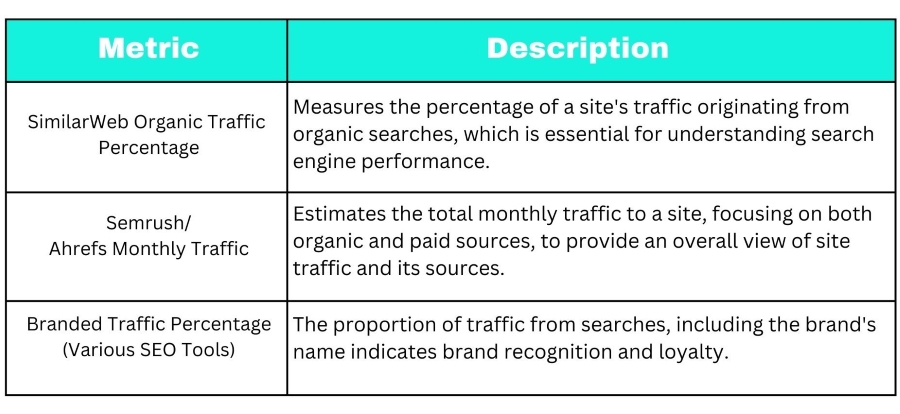
2. Link Metrics
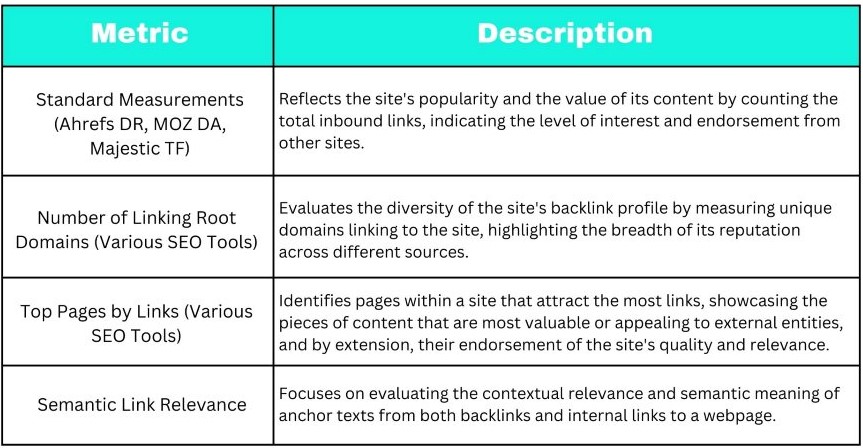
3. Keyword Metrics
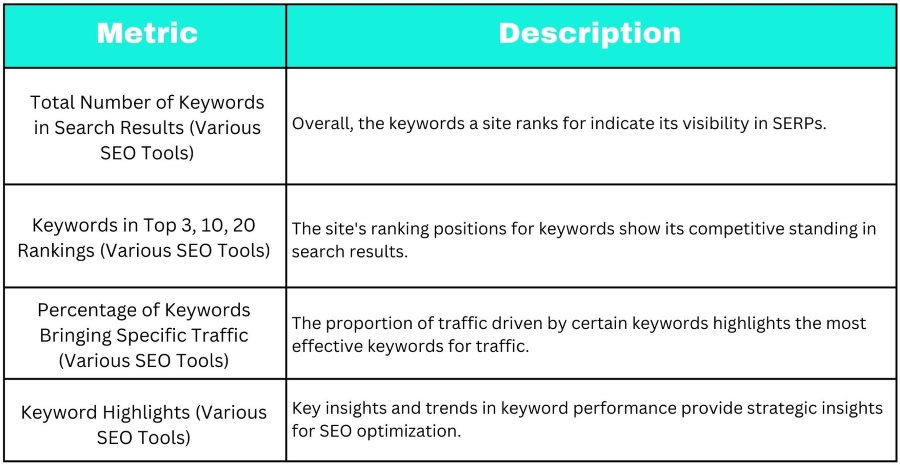
4. On-Page Metrics
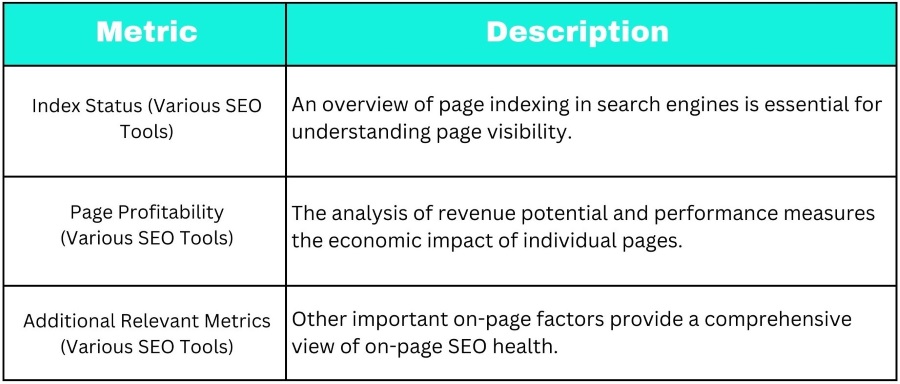
SEO Benchmarking Template
Discover our SEO benchmarking template to streamline your performance analysis and set actionable goals.
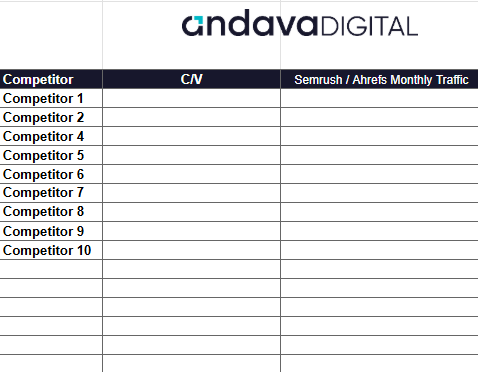
Regular SEO Tracking and Reporting
Achieving success in SEO is not a one-time task but an ongoing journey. To stay on the right track, it’s crucial to regularly track your SEO performance against the benchmarks you’ve set. Utilizing benchmarking software like Google Analytics and Adobe Analytics can provide comprehensive insights into traffic, user behavior, and other SEO benchmarking reports. These insights, coupled with regular monitoring, enable you to measure progress and make data-driven decisions.
Keep a close eye on key performance indicators (KPIs), track keyword rankings, and analyze website traffic. By doing so, you can adapt to changing algorithms and user behavior, refining your strategies for continued SEO success.
What’s Next?
SEO benchmarking is a critical process for enhancing a business’s online presence. You can significantly boost your website’s performance through careful analysis, strategic planning, and targeted implementation of SEO improvements.
To make this process more approachable, consider initiating a straightforward benchmarking task. This practical step can ease the perceived complexity of benchmarking and empower you to continue refining and adapting your SEO strategy.